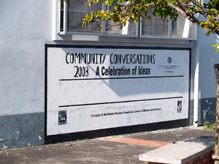 community conversation series stops in KwaLanga
community conversation series stops in KwaLangaAug 18, 2008 – The Nelson Mandela Foundation held another event in the series of community conversations in KwaLanga on July 24, 2008
About KwaLanga
Under apartheid, the system of racial segregation that was in effect in South Africa from as early as the 1930s to the early 1990s, people were classified as white, black, coloured or Asian and forced to live in separate residential areas. Although those laws are no longer in effect, many of Cape Town’s neighbourhoods remain largely segregated by race. Black neighbourhoods, most located far from the city centre, include Langa, Nyanga and Gugulethu, along with Khayelitsha, a township in which the housed population is now greatly exceeded by the informal settlement.
Langa is a population that was driven away from an area called Ndabeni. In 1923 the Urban Areas Act was passed, forcing Africans to live in locations. Ndabeni was overcrowded and the white middle-class residents of nearby Pinelands were keen that it be removed, so a new location named Langa was opened. The name literally means “sun”, but it is derived from the name of Langalibalele, a Hlubi rebel imprisoned in Cape Town after rebelling against the Natal government. Local residents refer to their township as KwaLanga, which will be the name used in this report.
KwaLanga is not new to struggle; it is one of the oldest townships in the country and faces the challenges of HIV and AIDS, alcohol and drug abuse, a high rate of school drop-outs, poverty and teenage pregnancy, among other issues.
Social mobilisation
Social mobilisation is a forerunner element of community conversations, focusing on engaging people for the purpose of getting them to take a particular action. In KwaLanga, the purpose of the social mobilisation intervention was to get a minimum of 400 people to come together in a community space to talk about issues related to HIV and AIDS accelerated prevention.
The Nelson Mandela Foundation social mobilisation team arrived in KwaLanga on July 1, 2008, allowing three full working weeks to ensure that all elements of mobilisation were activated. The tactics included ambush marketing, tapping into local events and meetings, addressing school assemblies, pension and grants pay points, and locating youth groups or formations.
The team targeted “hot spots” like shops, tuck shops and informal trade spots, shebeens, hang-out spots, public spaces such as public libraries and community clinic waiting rooms. Announcements about the Conversation were made during the services at six churches. In addition to these tactical marketing interventions, the team engaged various institutions, government, business and societies working in KwaLanga.
They also used planned platforms:
loveLife’s Born Free campaign, attended by about 60 young people
a KwaLanga Development Forum meeting attended by about 80 people
the Sowetan Community Builder of the Year Awards, in Cape Town on Friday July 18, attended by over 200 people
the Community Policing Forum’s awareness campaign, attended by over 800 people
On all these platforms the team explained what the community conversations were all about and extended invitations.
The team also used the following traditional approaches:
Street-to-street loud-hailing on the morning of July 24, covering wards 5, 52 and 53
Partnerships with
o The Office of the Premier – Western Cape Provincial Government
o Provincial Department of Health and Environmental Affairs
o Provincial Department of Social Development
o The City of Cape Town Metropolitan Council
o KwaLanga Community Health Centre (Clinic)
o KwaLanga Wards 51, 52 and 53 Committees
o ANC Parliamentary Constituency Office
o KwaLanga ANC Women’s League
o Siviwe Tours
o KwaLanga Orphanage
o Guga S’thebe (KwaLanga Tourism)
o Isilimela Comprehensive School
o Cape Town Tourism
o TB Care Association
o The Red Cross
o Nomzamo Orphanage
o loveLife
o ANC Youth League
o SANCO
o Langa Stock Farmers’ Association
o Elangeni Women’s Development
o Phila Sizwe Foundation
o Cheshire Home
o Radebe’s Guest House
Municipal participation
Local government departments are the custodians of community development, health, welfare and security, so getting the City of Cape Town directly involved was the team’s top priority. Meetings took place with various subdivisions of the Cape Town Metropolitan Council in order to garner support and participation for the community conversation in KwaLanga. The Office of the Executive Mayor ultimately decided to support the event by providing lunch for 1 200 participants, the public address system, a marquee and 200 chairs.
Other contributions
The Department of Social Development contributed to the public address system for the Khululeka: DJ Phat Cat performance day. The Department of Health provided breakfast for 1 200 participants and contributed to the PA system.
Media intervention
Community radio has grown rapidly over the past decade, with over 100 stations now on air and a combined listenership of about 17-million people (2007 survey, past seven days’ listenership). Team member Paddy Nhlapo was hosted by the most popular DJ on the station Umhlobo Wenene, along with a 22-year-old from KwaLanga who had attended last year’s youth dialogue. They enjoyed an eight- minute talk about community conversations with Amaza.
Live reads were done on the most popular community radio station in the Western Cape, Zibonele FM, three times a day on the most popular shows from July 22 to 24.
Posters were placed in strategic points, including taxi ranks, shops, taverns, street poles and at youth centres. Flyers were distributed at meetings, events and church ceremonies. Other media were present at the Conversation too, invited by the Nelson Mandela Foundation.
The Conversation
The Conversation took place on July 24, 2008 and lasted for three and a half hours. It followed the process of introduction, setting ground rules, counting losses, storytelling and selecting an action committee. More than 1 100 community members attended at the Johnson Ngwevela Community Hall in KwaLanga – the same venue where a youth dialogue was held last year. Half were women, a fifth were men and the rest were youth. They came from KwaLanga, Mannenberg, Gugulethu, Athlone and the surrounding informal areas.
After the “counting your losses” exercise, when people place a small stone on a memorial cloth as a token of lives lost through AIDS, these were some of the reflections from participants:
• “Most people are afraid of taking their treatment because people laugh at them when they go there. People are scared of testing. It’s sad to see the stones there; our people are dropping like flies. The people we love are gone.”
• “I’ve lost many relatives due to HIV, but now I’m happy that we can talk about HIV and AIDS. Back in the old days we used to be ashamed to talk about it. In the beginning when you were infected and disclosed to your parents they used to be disgusted and would isolate you because you had a virus. They felt that you would infect them if you used the same equipment in the house.”
• “This is a good exercise that has brought a lot of healing for me. As a caregiver I try to encourage my patients to take their ARVs but most of them ask me how they can take them when there’s no food in the house.”
The storytelling exercise started off with this outline: On the campus of the University of Cape Town, Vuyiswa Nogam, an attractive young girl from a Christian family in KwaLanga, is invited by a friend to a “freshers’ ball”. There, she is offered a drink by Vuyani. She passes out as she hears the other girls chanting: “Akukho mntwomnt’apha, kuseKap’apha, thath’ umntu uhambe!” (This is Cape Town; nobody belongs to anyone; take a person and go!) When she wakes up in the morning she’s naked in a room full of strange boys and there are drugs present. She later takes a pregnancy test and, following the advice of the pharmacist, an HIV test. She finds out she’s HIV-positive. She asks herself: What’s happening to me? What about my future and education? Do I tell my parents? Do I confront Vuyani? Do I share this with my friend Xoliswa?
At this point, the community was asked to take the story forward by putting themselves in the shoes of the characters and thinking about how they would handle the situation. Some of the answers to the questions were as follows:
What would you do if you were Vuyiswa?
“I would not tell my boyfriend. I would tell my parents, not my friends.”
“I would look after myself and think of my parents.”
“I would go to the doctor and afterwards I would seek help from social workers. You must have choices in life.”
What would you do if you were Vuyiswa’s family?
“I am talking as the grandmother of Vuyiswa. I would send her back to school because her future is still ahead of her.”
“I would support her all the way.”
Would you talk to your friend Xoliswa?
“I would not tell her my status.”
Would you confront Vuyani?
“I would tell him the real story that I woke up in the morning with lots of boys around me. I would make him accountable.”
“I would confront him and tell him I’m HIV-positive.”
“I would tell him I am positive, and ask him to find out his status and not spread further.”
Difficulties encountered at the conversation
There was a slow influx of people into the hall until the community was served sandwich packs with fruit and juice; some people then left the hall to call friends and the crowd became difficult to control. The event started an hour later.
Alcoholism and drug abuse is rife in KwaLanga and many community members came drunk to the conversation. This made it difficult to manage the crowd and to follow the process effectively. People started talking during the quiet “counting your losses” time and some of the comments were influenced by alcohol rather than sincere feelings, resulting in laughter at what should have been serious issues.
There were many young children at the conversation who had come with their parents and they became restless after a while.
Success factors
There was a strong media campaign around the conversation. The Department of Health participated enthusiastically, paying for the food and a powerful sound system which meant the whole event was clearly audible. The mention of Nelson Mandela’s 90th birthday created interest in the event. Having food at the event enabled community members to stay longer.
Burning issues
The KwaLanga community brought up these issues as their strongest concerns:
Encouraging testing
Support for people living with HIV and also people who are not infected to encourage disclosure within families and community
Substance abuse
Poverty is the source of most of the temptations and challenges faced by youth in their communities with regard to HIV and AIDS. Alcoholism and substance abuse put young people at risk as they tend to be oblivious to the messaging done around the subject. Because this abuse is a fashionable form of escapism, many people make fun of serious situations. As a result, people who are infected are afraid of disclosing their status even to their families, for fear of being made laughing stocks. People are also afraid to be tested.
Agreements reached
These are the words of community members at the conversation:
“My heart bleeds as I stand here in front of my community. I grew up in a proud society which understands that everything we have has been given by the Almighty. We are a people who believe in culture and pride. The problem now is that alcohol has taken away our pride as a people and has reduced us to nothings. Our youth drink too much and they smoke dagga and other drugs I can’t mention. The sad thing is that these drugs destroy our grandchildren’s minds. We found it here and we will die and leave it here.” (A group of boys was laughing while this old man was speaking.)
“I’ve lost my daughter to HIV; now I’m looking after her son, my grandson. Fortunately I received support from my two neighbours sitting beside me here today. They helped me until my daughter died.” (This woman was intoxicated and some people were worried that she would disrupt the Conversation if she got the microphone, but after she had spoken everyone applauded as she had spoken from the heart.)
A committee was elected consisting of representatives from each of the community groups. They agreed that they needed to obtain free training in planning and management to give them the skills to tackle a voluntary counselling and testing campaign.
A concern was expressed that committees driven by unemployed people tend to break down because of the difficulty of carrying costs such as taxi fares and meals. It was suggested that a stipend would help the action group to function. The committee members suggested using the ANC constituency offices as a meeting venue. They also decided to meet first at the local library with all stakeholders (such as local and national government representatives and NGOs) to lobby support.
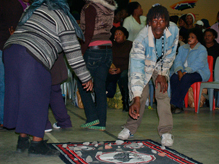 KwaLanga community remember their dead
KwaLanga community remember their dead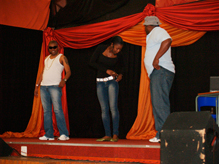 Khululeka play on the eve of the community conversation highlights the issues in the community
Khululeka play on the eve of the community conversation highlights the issues in the community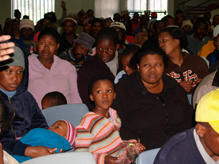 Members of the KwaLanga community listen in during the recent conversation
Members of the KwaLanga community listen in during the recent conversation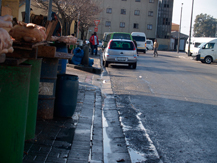 The streets of KwaLanga. Langa literally means “sun”
The streets of KwaLanga. Langa literally means “sun”